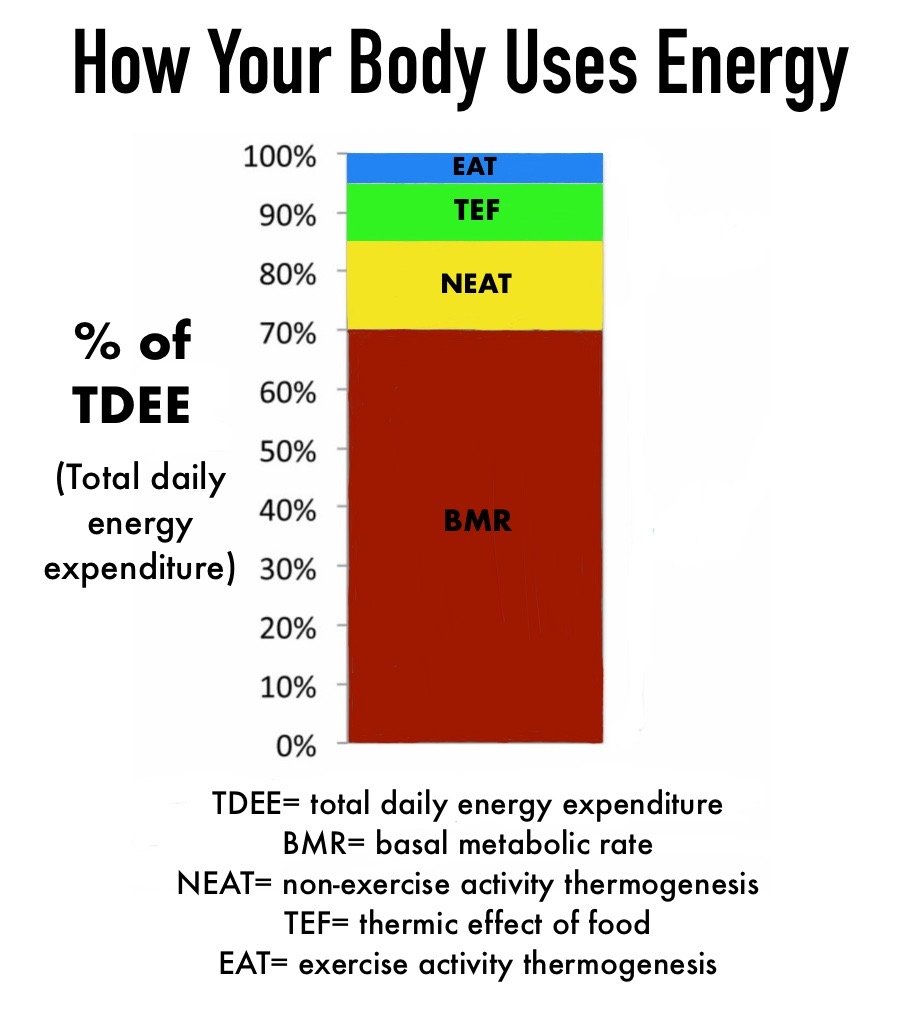Energy out or how we burn calories
When we hear the term 'energy balance' or ‘calories in vs calories out’ what does that actually mean? Well, calories in is quite literally the food you consume. Your energy intake. Calories out is a little bit more complicated. What makes up calories out (which is the amount of calories your body expends on the daily basis) consists of several things: BMR (basal metabolic rate), NEAT (non-exercise activity thermogenesis), TEF (thermic effect of food) and Exercise Activity. All 4 comprise your TDEE (total daily energy expenditure).
Let's look at the 1st one - BMR. (Basal Metabolic Rate) is the amount of energy needed to perform basic, life-sustaining functions. Like circulation, breathing, cell division, etc. For example, that would be you lying still in bed doing nothing. The amount of energy required for this would be your BMR. It is by far the biggest component of our total daily energy expenditure. While there are several components that affect your BMR, one of the biggest ones is the amount of muscle you are carrying on your frame. The greater the amount of muscle - the higher your BMR. That’s why it’s a good idea to invest into the muscle bank while you still can!
Then we have NEAT (non-exercise activity thermogenesis). NEAT is a little more difficult to measure. Essentially it’s all your non-voluntary movement, like you holding your posture, blinking, fidgeting, tapping your foot without realizing you’re doing it, hand gesturing, etc. Basically it’s all the small movements you make through the day without thinking. NEAT is like a moving target. It varies from day to day. Some days you run around doing errands, shopping, helping your friends move into their new house and some days your NEAT is very low, because the only times you get off the sofa is to get some food and use the bathroom. During a diet phase NEAT can drop significantly. Studies show it can drop as much as 500 calories a day. When you are on low calories you just don’t want to move as much. Instead of getting up to grab the remote to change the channel on TV, you would rather sit and keep watching Judge Judy, or whatever is on. You just don’t feel like exerting yourself. Our bodies are smart. They want to hold onto extra stored energy. It might come as a surprise, but your body’s main mission is not to give you abs, but to keep you alive by all means possible.
Then you have TEF (thermic effect of food). Some of the calories in the food you ingest will be used to digest, absorb, and metabolize the rest of the food, and some will end up burned off as heat. The best analogy I heard was to compare your body to a car’s internal combustion engine. You have to put in energy to get the energy out of the food you eat. Different macronutrients (and as you now know we have 3 of them - protein, carbohydrates and fat) have different TEF. Protein is an absolute champion here. TEF of protein is between 20-30%. While carbohydrates TEF is 5-10%. And Fat’s TEF is only 0-3%. So as we can see your body has to work a whole lot harder to digest protein than the rest of the macronutrients. But one thing is for certain: there are no energy-negative foods. You will alway take in more energy from food than your body will expend digesting it. Energy-negative foods do not exist, no matter what you friend told you about celery!
The last is Exercise Activity. These are simply calories you burn through purposeful exercise. This component is highly variable in individuals and we will talk about it more in the future.
When we add up the above 4 (BMR, NEAT, TEF and Exercise Activity) we get all the energy you expend during the day. When that expended energy equals the energy from food you eat, you maintain your current weight. For the purpose of weight loss (fat loss desirably) we MUST create calorie deficit, where the energy you expend is greater than the energy you put in. If you are not losing weight, you are NOT in caloric deficit. If you THINK you are in caloric deficit BUT not long weight, you are NOT in caloric deficit. Period. Ive had clients who told me how HARD they were dieting: not eating in the morning, not eating after 6pm, eating 'clean', etc. (without tracking mind you) and being stuck at their current weight. Were they truly in a deficit OR because of the perceived mental effort they exerted they THOUGHT they were in a deficit? Hmmmm...
Now for some people with certain hormonal dysfunctions that may be more difficult than for the healthy population, but it’s not impossible.
Caloric deficit can be achieved by eating the same foods you are currently eating. It doesn’t matter what diet you are adhering to. What matters is that it fits your lifestyle, keeps you healthy and energetic, and can be sustained indefinitely. No need to jump on the latest and greatest fad diet.
There are no super foods, or special weight loss foods, or magic shakes or juices. There are foods that cause you to be compliant and stick to your calorie deficit, which in turn causes you to lose weight.
There are instances when people truly eat very low calories and NOT losing weight. That is often due to their metabolic adaptation and is the subject for another day.
So to sum it all up...losing weight is a numbers game. Get them right, stick to them for long enough and the weight will come down. Utilize your biggest guns first - BMR (resistance training) and NEAT (don’t stay still all day). This fat loss method is not sexy. it sounds boring in fact, but it works!
I ask my clients to track for 14 days, add their total daily calories over this period and divide by 14 to find the average daily intake. Let's say you are taking in 2,000 cals now and maintaining your weight. In order to start losing, give yourself a new daily target of 1,700 and try to hit that each day. If you are truly creating a caloric deficit in your diet you will start seeing changes in the right direction. Now, granted 300 calorie deficit is a modest deficit and you wont see drastic body weight loss per week on that. But that's a start.
Next time I will share with you how to set up your macros - protein, carbs and fat in order to maximize your body composition while on a diet. No one ever said "I wanna be skinny fat when I lose weight", right? So make sure to check back in for that post.

